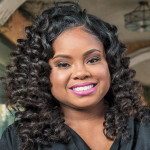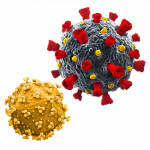I’m a long-term HIV survivor. I know about terror, isolation, loneliness, loss, hazmat suits, false positives, asymptomatic spreaders, condom fatigue, virus variants and resistance — even getting cured of hepatitis C. Nonetheless, the onset of the first COVID-19 pandemic restrictions in California had me panicked.
I thought, “I’m locked in with my 90-year-old mother in her assisted care!” I just couldn’t leave her alone not knowing when I’d see her again. Unable to afford private care for her, I became her caregiver. I took a photo of her in her dimly lit 400-square-foot room, sitting in her wheelchair, and posted it on my Facebook page.
At least we don’t have to worry, I told myself, about toilet paper or food, big concerns after roaming through the empty shelves at Trader Joe’s in the days just before the lockdown. Once again, I found myself at the epicenter of a new deadly virus, only this one wasn’t sexually transmitted — all you had to do was breathe.
So, masks became the new condoms, in the hope of protecting ourselves from contracting the new coronavirus and possibly ending up in a hospital on a ventilator and dying. I no longer went to the market, avoiding the drama of the anti-mask protestors. I became a shut-in, feeling safer indoors than out.
In addition to masks, there were temp checks, gloves and hand washing several times a day. Those were the safety protocols resulting from the first flood of deaths in nursing homes and retirement communities. A year later those places would become the first tier for the vaccine.
March 11 marked the one-year anniversary of COVID-19 with a death toll of over 500,000 Americans. The last time I was out among people was March 8, 2020. I was the speaker at a large meeting. I began with my own announcement, “Please don’t be offended if I’m not hugging or shaking hands afterwards. There’s a new very contagious virus out here and we have to be careful.”
Meanwhile, the place was packed and I sat shoulder-to-shoulder with a friend of mine talking about this new virus. She too was trying to protect herself as best as one could with no information. She whispered in my ear, “We probably shouldn’t be this close.” She began shuffling her chair away from me, leaving a touch of space between us.
In an instant, our world changed. The images on television showed the world was sick and shutting down. The number of rapidly mounting deaths ticked up the numbers each minute. Images of patients on gurneys packed in hospital hallways dying. In New York, freezer trucks lined up outside with dead bodies like a Stephen King movie. The hospital ship USNS Mercy pulled into the harbor for the overflow of patients. I felt enraged, my blood pressure rising, listening to the man who unfortunately was our president. This didn’t have to happen. It didn’t have to be this way.
The former president’s daily dose of rants targeted minority communities, putting all of us in harm’s way, but in my mother’s kind world of the oldest of the old they were resilient. They had survived polio, the Holocaust, World War I and II, the Great Depression, loss of their spouses and their adult children who were lost to AIDS, my generation.
Now, in the twilight of their lives, they were restricted to their rooms all day, getting meals left at the front door of their apartments delivered by caregivers wearing personal protective equipment (PPE). At first, they said it was just for two weeks. I can handle two weeks, I thought. In the beginning, it was just temp checks. I soon began having my doubts that this monster of a virus was not going to be a two-week isolation.
I could hear ambulances outside day and night racing to a hospital blocks away. This was going to take much more time. Months, maybe more. The facility opened up at the first opportunity close to that two-week time frame only to shut down again. Frustrated, the voice in my head began screaming, “We need testing! Where’s the testing?”
I repeatedly asked the nurse for testing, but it would be weeks before that would arrive. What did arrive were a few men and women wearing professional PPE from head to toe. Gloves with masks under their face shields while dragging long tubes behind them like a scene out of the movie E.T. The disinfectant spray in the halls created a fog-like mist. They were focused on one room in particular, where a resident died of COVID-19, just across the hall from my mom and me. Feeling light headed and nauseous, I returned to my cocoon, the safety of my mother’s room.
A few days later, there was a knock on our door. It was the nurse and her assistant. They had come to test us. I felt like I was a Jew in hiding. The nurse asked, “Could you please bring your mother to the door so we can give her a COVID test?” I pushed my mom’s wheelchair up to the door. The nurse stuck a long cotton swab up her nose while my mom squeezed my hand.
Then it was my turn. I had a scratchy throat and was already sneezing. I was anxious about my COVID test. I was confident taking my HIV test in 1987 because I had no symptoms, even though I was positive. My COVID fears were mounting. I thought, “We need a vaccine! But they still haven’t found one for HIV. Will they find one for COVID in time to save us?”
A few days later I got the call, “You tested positive for COVID.” What a déjà vu. I felt numb. I thought, “Is this it? Is this how I’m going to die? In a retirement home taking care of my mother? After 34 years living with HIV, is this how it ends?” The next day my mother’s test came back positive. My heart broke. I was horrified. The both of us had COVID-19. What a nightmare. I began to steel myself for what may lie ahead.
We had no fevers, but my pounding headache was relentless, as if someone hit me in the head with an iron frying pan. My body ached and I couldn’t taste, a very odd experience. I posted my status on my Facebook page and got flooded with support from friends who shared their experiences with COVID-19. I had no idea how many people I knew had survived the new coronavirus.
Their “COVID at home” remedies seemed effective and user friendly. I tripled our vitamin C intake, added zinc and Pedialyte, vitamin D and Tylenol for the aches and, most importantly, to sleep on your side or stomach, never on your back, making breathing more difficult. I didn’t sleep much, as I watched over my mother breathing through the night.
One night her breathing appeared heavier, and I had no way to monitor her oxygen levels. I feared I’d have to call an emergency medical technician to send her to the hospital alone. I stayed on the phone with a friend who is a doctor. I spoke to my mom’s doctor who warned me, “This is a very serious virus. Don’t wait too long. Try to avoid going to the hospital. It’s very busy and you won’t be able to go with her.”
Thankfully, we got through that night and the next, counting those following days with a watchful eye. As bad as I felt, I had a mild case. The virus made its way out soon enough, 10 days for both of us. Some residents moved out to be with their families. Some went to the hospital sick. I could see medical trays in front of several rooms on our floor. I felt stigmatized by the medical tray that sat outside our door, a remnant from my HIV past. We were in our room quarantined with COVID-19 for 15 days. Sadly, COVID-19 did claim a few of the residents.
It has been a year since COVID-19 entered our lives. My mom and I are both vaccinated against the new coronavirus, as is the entire facility. We celebrated her 91st birthday. The gift was intimate time spent with my mom, whose dementia progressed along with my depression. My hair is white for the time being. My eyes are fatigued from too much screen time, watching too much news, Netflix, Zoom meetings, online yoga and 12-step meetings.
March 13, 2021, was the first time in a year that I met a friend (who is vaccinated) for coffee. Walking toward each other, wearing our masks, we hugged and then stood socially distanced in line for our coffee, which was kind of funny. I was so happy to see her, even though I couldn’t see her smile. It felt great to be free from confinement, but still feeling insecure.
It’s going to be an adjustment. We remarked how strange it felt to re-enter the world. We reminisced, looking out on empty tables, ghosts where we once gathered with friends and places we will not go to again. It was a short visit, a re-entry into the world neither of us had seen in a year. We were grateful for a new day and a new compassionate president.
This opinion was written by Sherri Lewis, click here to read more about her journey.







Comments
Comments